2023 Day 1 Check in
A vlog about how my StoryADay May is going…
A vlog about how my StoryADay May is going…
Write a story using this helpful structure from Rachel Swearingen
Expand, Narrow, Explode the Frame
Write a scene in which a character is looking for something or someone that has been lost. Use all the senses to describe the setting. Give us a sense of the body and include the following “moves” in any order:
1. Allow the details of the scene to feel close, contained, even constricting.
2. Describe the thing that has been lost, a brief memory perhaps that has been triggered by its loss.
3. Look down. Zoom in on something very small.
4. Bring in a distant sound.
5. Draw attention to an opening of some sort, a window, a door, a hole in the wall or in a dense wood or in a thick covering of clouds, for example.
6. Can your character see or sense what is beyond that opening?
7. Allow your character to climb down or up or into for to a new vantage point.
8. Is your character alone? Invite a stranger to the scene. What happens now?
Rachel Swearingen is the author of “How to Walk on Water and other short stories” which received the New American Press Fiction Prize. Find out more at RachelSwearingen.com
Join the discussion: what will you do with today’s prompt OR how did it go? Need support? Post here!
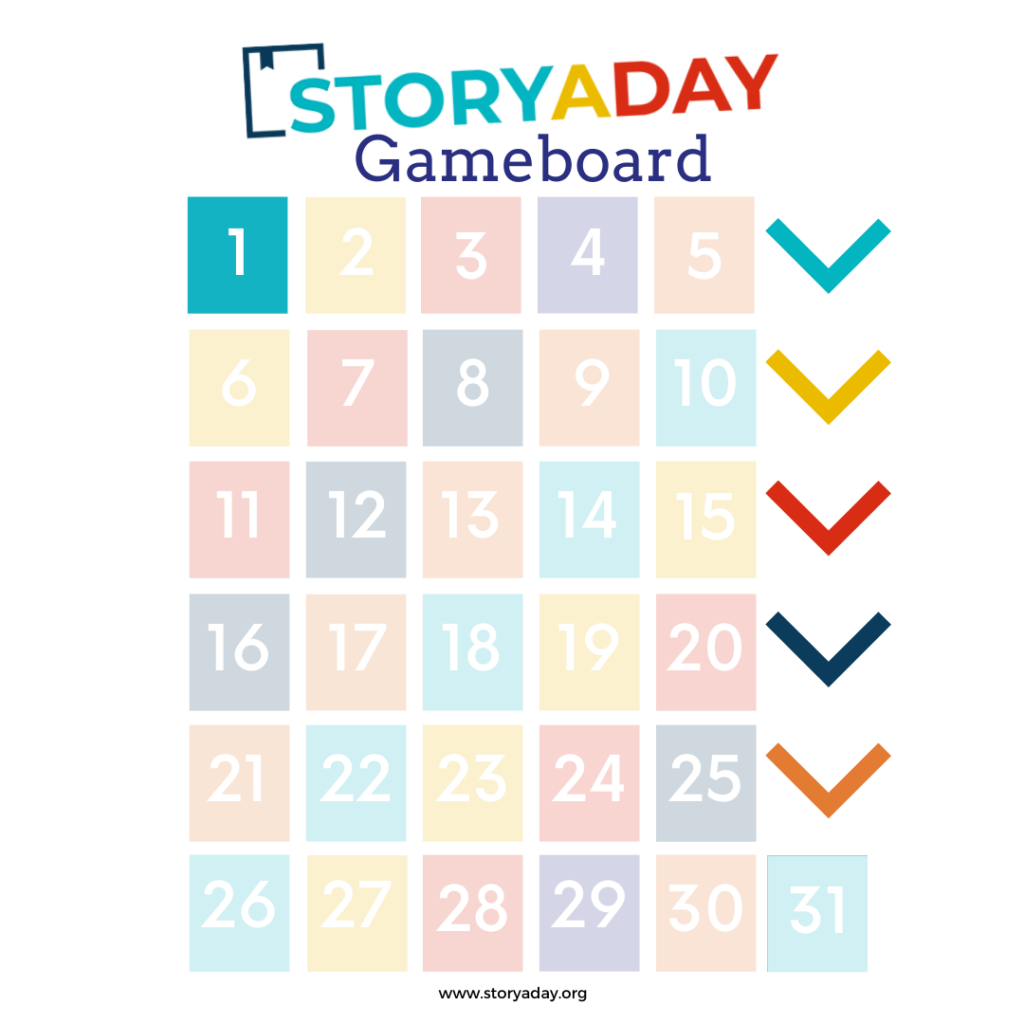
Here’s your next Game Piece. save the image and share on social media with #storyaday
Prefer paper crafts? Here’s the cut & paste version
Read this tips for the StoryADay Challenge…and get your gameboard!
May is almost upon us!
Here are some tips on how to participate fully in the challenge:
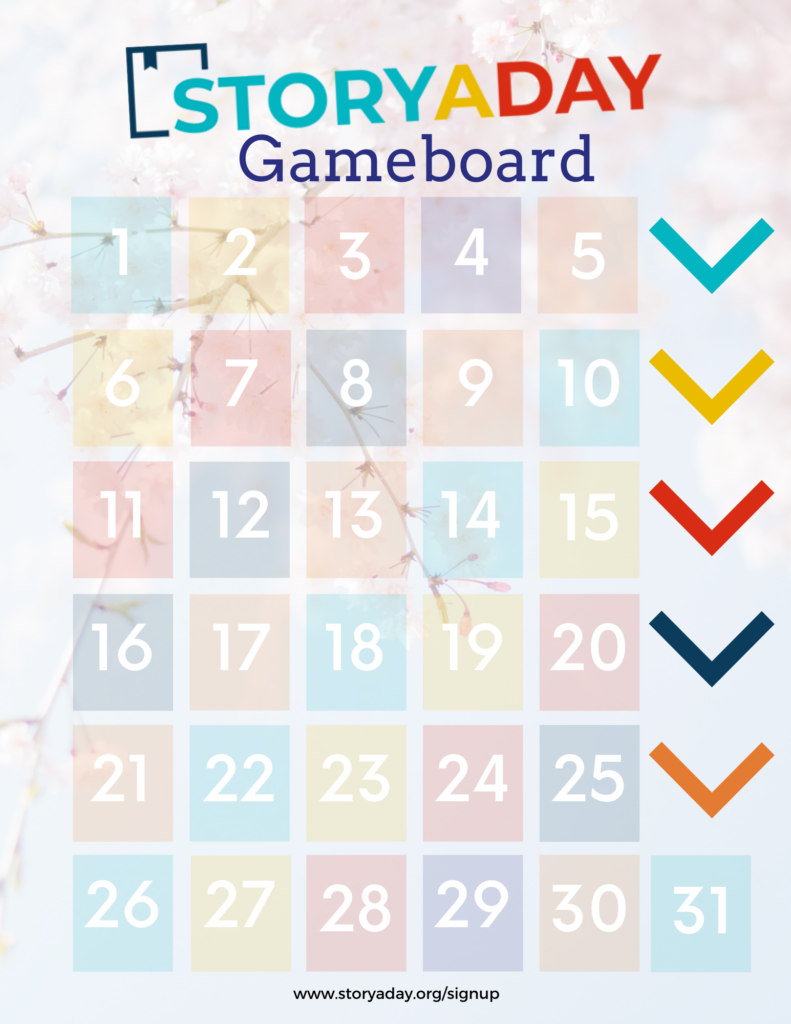
Each day of the challenge I’ll post a graphic you can save and share to chart your progress. Keep it secret or share on social media using #storyaday
OR If you’d like to get away from the screen and do some handi-crafts, print out this version of the game board and pieces. Cut out a piece for every day your write and paste it onto the game board. Proudly display it in a public space or take pictures and share on social media, using #storyaday
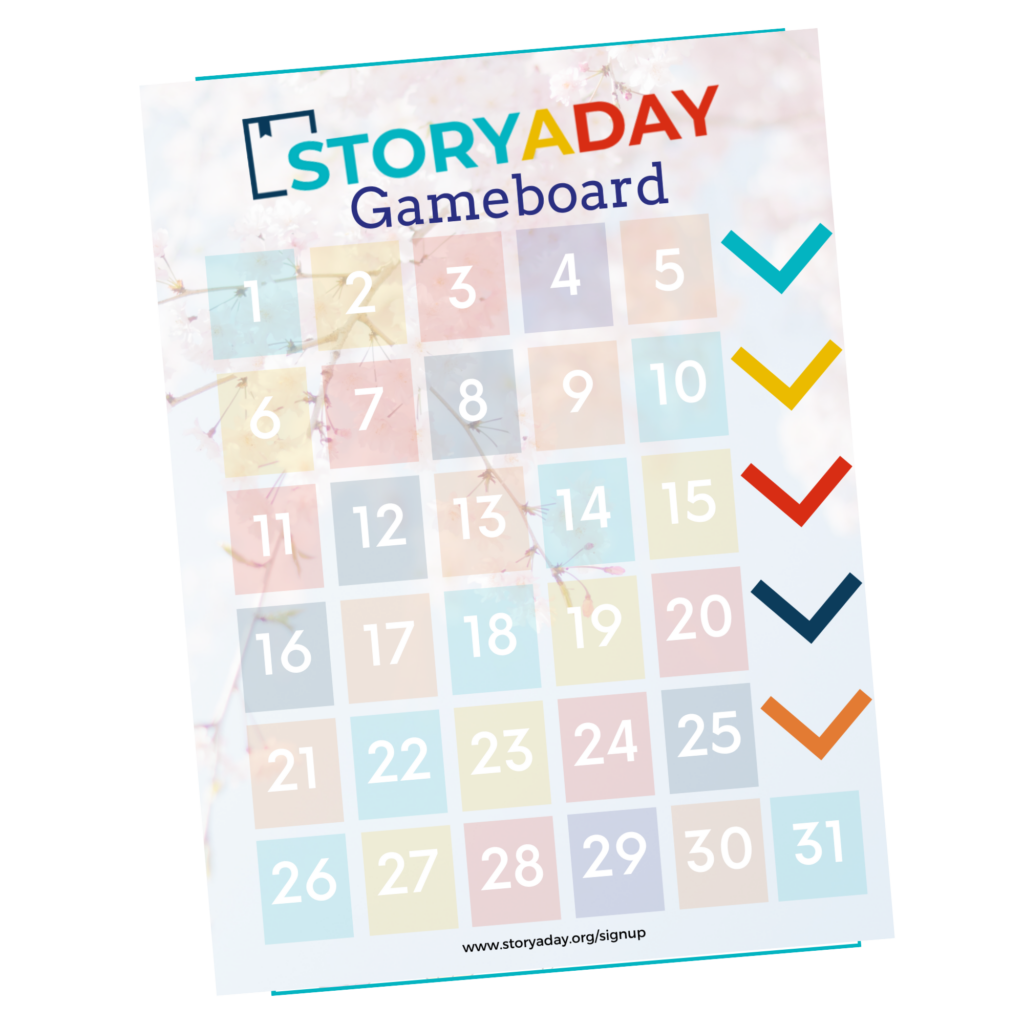
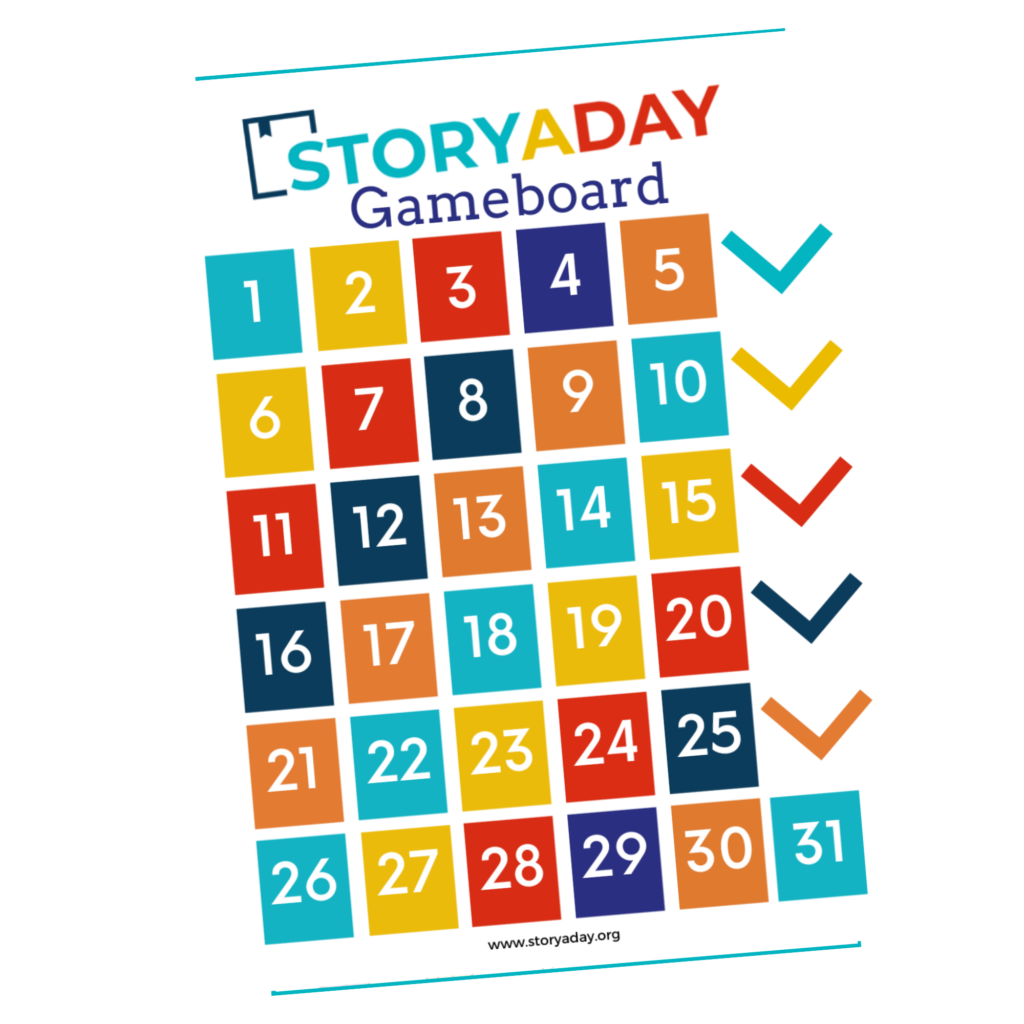
You don’t have to write every day but you should push yourself to do as much as feels a little intimidating…and then review every week to see if you want to change your commitment)
Pick a notebook or create a folder on your computer to house all your StoryADay related writings
Especially if you’re hand-writing. You won’t be sorry!
Every day, come back to the blog and post to let the community know how you got on…yes, even if you didn’t get on well!
The support you’ll get is well worth the effort!
I mean, if you are highly motivated by streaks, you can.
For the rest of us, I strongly recommend closing the door on days when you didn’t write.
Part of the point of this challenge is to learn about how write, long-term. Do you tend get crushed by set-backs? Learn to keep going during this challenge!
(Use the community to help keep going. Post if you need a word of encouragement)
Keep It Secret, Keep It Safe
I do encourage you to post about your writing, but I don’t encourage you to post your actual stories.
For one thing, the idea of having to write AND polish a story every day is paralyzing (trust me, I always try to find ways to circumvent this truth, and I never succeed). Just write. Play in the mud. Make a mess. Enjoy yourself.
The second reason is more practical: if you ever want to have someone else publish your piece, they likely won’t take it if it has been published somewhere before, even on your blog or social media.
Not just whether you wrote or not, but how you’re feeling, how the effort is going, anything else that will help you build your writing practice, after the challenge is over.
I’ll send you a ‘debrief form’ at the end of the challenge, but make sure you keep notes as you go along.
You’ll learn a lot this month. You think you will remember all the lessons but you won’t. Keep notes!
This is a ridiculous challenge.
Part of the point is the have fun with your creativity and part is to help you lower your expectations and fight procrastination.
Just keep moving forwards.
Talk to other people in the comments.
Notice when you write a line you like.
Notice when you exceed your expectations (but just don’t raise them again
Check your email later today for an invitation to our kick-off party (bring your questions, nerves, and suggestions to help others).
Keep writing (and writing, and writing).
Julie
In which I answer questions sent in by the StoryADay Community about how to overcome their writing challenges.
On this episode of The StoryADay Podcast, I discuss how to manage fear when it comes to writing, and how to overcome common struggles that writers often face.
You’ll learn why taking action is key to managing fear, and how participating in Story A Day can help with perfectionism and encourage creativity.
I also dive into the importance of having a deeper purpose for writing, and how to find motivation when it feels impossible to make time for writing.
Tune in to hear about the Story A Day Superstars Group and how it can help writers build community and celebrate their successes.
Plus, learn tips and tricks for acquiring and polishing writing skills. T
his is a must-listen episode for anyone looking to find inspiration, motivation, and guidance on their journey as a writer.
LINKS
Sign up for the StoryADay Challenge
Find out more about the Superstars group
Watch vvv
StADa285 StoryADay QA
Good morning. Good evening. Good afternoon, Julie, from StoryADay here.
We are a little over a week away from StoryADay May.
I sent out a survey recently asking you all. About your secret dream for your writing life? I talked a little bit about that in the last episode. I also asked about people’s biggest challenge.
When it comes to writing at this moment in your life. And that’s what the first question. There was a lot of very personal heartfelt. Honesty in the answers. And there was a lot of. Similarity between what you all had to say. Everyone has their own take on it. There were certain people struggling with different areas of writing.
But, and none of it surprised me and none of it made me feel like any of you needed to quit. I think what we need to do. Is acknowledged that writing is hard. And there’s no better way to do that than to hang out with other writers because I, I. See this, I see all these answers and I’m staring at a screen of them right now.
I see all these answers and it’s all stuff I’ve heard. From other writers that I’ve been hanging out with, who are going through the process of writing.
And I’ve been hanging out with them for the past couple of decades and this stuff is. Is part of the process of writing. So let’s talk about what am I talking about? Things that I see in the survey.
Making time and space to sit and write every day. Consistency of output, finishing what I’ve started. The confidence to keep making, moving forward, having the team and capacity to rate. All of these things. Are. Incredibly common among us. It’s very difficult. To take words. And create worlds.
And create interesting characters. And put them in fascinating situations that have twists and turns and can hold somebody’s interest. And we all read these wonderful books that have been published that have been through the polishing process and the revision process and the draft after draft, to get them to be
brilliant and twisty and fascinating. And much less often do we get to look at first drafts. Second drafts. Or to hear from writers who are going through that process.
It turns out that.
Everything we think we need to do in writing usually comes with an asterisk. Yeah, you have to write a polished draft that goes through multiple revisions. Except some of it may not. You might actually. write a great couple of scenes that stay intact all the way through the process.
Yeah, you have to write consistently, but consistently doesn’t mean every day.
It means keep coming back to it. Don’t leave a three year gap between stories that you’ve written.
People who are retired or out of work will tell you that simply having space and time for your writing does not guarantee that you’re going to be able to sit down and write, because once you’ve solved the time and space issue. Then you have to deal with all the inner stuff. Am I good enough? Do I know what I’m doing? The fear of of not being good enough.
Which is by far the harder problem to solve. It is solvable. Because. Those kinds of fears. Am I good enough. Am I going to be able to, am I interesting enough? I’m going to be able to write this way or that way, these. Once you acknowledge that chatter is happening in your head. You can give it a name and that name is fear.
And once you have a name for it, you can start thinking about it. And once you start thinking about it, you look at these questions that are popping up in your head about, are you good enough? Can you do this? Can you write an eight? Eight 80,000 word novel. Can you tell an interesting story? All of these things are skills.
That you can acquire that you can build that you can polish.
And the thing about fear as the bravest people in the world will tell you. Is that it doesn’t go away. You just get better at managing how much power it has over you and the way to manage that power that it has over you. Is by taking action and doing a thing. So if you’re feeling fear,
The best thing to do is just to write anyway. It won’t be as bad as you thought and the , next time you feel that fear, you will know that you can push through it. And the more you do that, the less of a hold fear. Has over you.
So if you are. Avoiding your writing for some reason, if you are sitting down at your desk and then stepping away to do something more easy, clean the kitchen or do the laundry or make a meal. These are things that you know how to do. So they are easier, even if they’re not more enjoyable, they might be, but I don’t know who you are. If you enjoy cleaning the kitchen
more than you enjoyed writing. The point is. That. If you don’t know why you’re getting up and running away from your desk. Whenever you want to sit down and write it’s possibly fear-based. So call it that and then have a look inside and see what those fears are. Are they about. You’re afraid that you’re going to write a boring story. Okay.
Then write a boring story and then go and figure out how to make it more interesting. Don’t wait for it to come out perfectly, and be interesting on the first shot. Write some characters don’t put them in a setting, ask them some questions. What do you want and why can’t you, why don’t you have it already? And then start listening to what.
What comes out of your brain as you write, and you have to be writing for those answers to appear.
And once you’ve written your boring story, you’ll discover that the world did not end. And you get to write more stories or you get to revise this story. But nothing permanent happened. And if you feel like nothing happened in your story, then you go and you read some articles or a book about story structure, or how to add tension to a story or how to inject conflict into a story.
And you go and ask other writers, how do you do this? I had an example of this the other day. I’m writing. I’m writing a romance. I got a little stuck and I talked to a friend of mine who specializes in romance.
And I told her the story and I told her what was happening and how I’d set it all up. And she immediately asked me one question that made me realize what my story was lacking. And it was just, she just has that skill in her toolbox that she understands that genres so well that as I was fumbling through telling her my story, she realized there was a huge piece missing.
And she asked me where’s this piece. And I said, I haven’t written it into the story. And she went well, start there and it was just a very low key question from her because she understood. The skill she has these tools. And she asked. The right question.
If you have fear about not being good enough, It might just be a lack of skills. You just don’t know if you have the skills you need, in which case you get to pursue the skills, you got to go find them. You get to ask people questions and say how do you do this? And if you’re hanging out with other writers, you’ve got a wealth of people to do that with. The good news for you is that the internet is full of writers who are very happy to talk about their process. So there’s tons of interviews and there’s tons of classes you can take. There’s tons of groups you can join to find other writers.
Even if you’re introverted. Joining a group and being with other people who are pursuing this difficult thing. Has been transformational for me. And for, I think a number of people. In the story of the superstars, which is opening up again soon. So keep an eye on your emails for that.
So if you have time and space to write and you’re running up against that fear there. There are some things that you can do to help yourself keep moving.
I think one of the things that we all have to do, and this will. Address those of you who said that you have. Trouble finding or making time to right now, there are genuinely lives out there that are very busy.
And especially those of you with young children or people, other people that you’re looking after or demanding jobs, or maybe three demanding jobs. Making time is tricky.
For some of us that is less tricky. But for all of us. The thing that will make it more compelling. For us to make time for a writing. Is to manage the motivation question. This was another one that I saw coming up for people was that they were struggling with finding the motivation to write, keeping the momentum going.
All of these kinds of words, cropping up in the survey. And the most powerful thing. I have. Discovered in this area. Is to think of other people.
To remove yourself from the equation a little bit. And weight more heavily the people who will be impacted by your story. And you can think about when you were a kid. And you read that book that just made you feel seen, that entertained you when you were down, that. Just moved you. And this doesn’t have to be when you were a kid, it could be last week.
If you think about that. And if you can keep your thoughts, cause I know you’ve got your thoughts, recent mailer minute. That’s why you’re a writer. You’re very creative. You’re very imaginative. I knew tend. I am speaking for myself. When you start thinking, doing this thought exercise.
It’s very common to think about. Oh, I want to create something like that, that, that moves someone and then respond to oh, but. Oh, but oh, . I have to write it all, but I have to finish it, or, but I’m not good at this, or, but I have to figure out how to get it published and blah, blah, blah, blah, blah, blah, blah. But that stuff is a different skill set. That is managing the business of being a writer professionally.
And you have to learn to put these things in silos and move that one over there. Let’s not think about that today. What we’re thinking about today is really. Thinking about your. Ideal reader. And.
Feel the love. For that ideal reader.
I know, it’s motivating to think about, getting checks from publishing houses and production companies and all of that kind of stuff. That’s great. That’s fine. That’s motivating. That gets you excited. Go for it. But it doesn’t tend to last as much because we’re all sensible people and we’re aware that there’s a certain amount of luck involved in there.
And you can’t guarantee that’s going to happen. You can guarantee that you can write something that will move someone. And if you have that, someone in mind, even a a theoretical person or somebody real from your life. It may be somebody who’s departed from your life already. And focusing on doing your best work
and trying to move that person, trying to reach that person, trying to help that person.
We’re pretty altruistic. I think. Most of us. And the idea of helping someone else is a really good way. to. Get over. A lack of confidence in ourselves.
If I was standing in front of you, and I cut my hand and I was bleeding and holding it out to you. I don’t think any of you would go, oh, I don’t really know what to do, but I’ll just, you just stand there with your hand bleeding. No, you’d grab a paper towel and you’d. Hand it to me and save, I don’t know, put pressure on it because , you know, that much.
And I don’t think anybody who’s listening to this, wouldn’t do that for me.
You don’t need to know how to do things perfectly, to be able to help people, touch people, move people, see people. If that helps you. Shift, focus from your shortcomings as a writer. To your aspiration. To help someone else. If that is motivating to you. Then hang on to that one.
And once you have that kind of motivation, whichever one you choose that really. Grabs you and moves you. Once you have that motivation in your mind.
You will. Find it harder to not find the time to write. So if you’re struggling to make time to write.
Keep in mind that deeper purpose that you have for writing. And you will find yourself much more motivated to cram little bits of writing into the little bits of time you can find. And two. Carve out pieces of time. Elsewhere.
We do have big dreams. And a lot of answers from people who have this big dream of publishing a novel. Getting the movie deal, but. They are. New mothers or. Have elderly parents to look after. And so the whole big goal of writing or finishing the novel, or this is also for people who’ve lost momentum and are one person said, which I think is brilliant.
When I’ve lost momentum on a project, getting started again feels like standing at the base of Everest in flip-flops. Tell me that’s not a writer.
Overwhelm. It’s really common. And. This will not be news to you, but the idea of chunking things down, making them manageable, doing what you can today and not worrying about the whole project,
is really the only way to get anything done. If you are feeling like you’re not being consistent enough or that you don’t have enough time, that you can’t imagine rating. 80,000 words on one project, you don’t have to. Not today. You have to write the next scene. Or you have to think about the next scene.
Maybe map out the next scene, what does it need to achieve? Who’s going to be in it. Where are they going to be standing relative to each other? Maybe that’s all you can do today. But that means that when you sit down tomorrow, you’ll have that roadmap and you’ll be able to maybe write. 500 words, 300 words of that scene.
We tend to be very ambitious, which is good, but we also tend to be ambitious, which is bad. Because we want to write 2000 words every day and we want to finish a story every day. Now I’m going to encourage you to do that during May , but that’s not a sustainable goal for the rest of your life. And that’s part of the reason.
That I do story a day, because I want you to understand that some days you’re going to fail and some days you’re going to write badly and some days you’re not going to finish and you just get up and keep going the next day. And then at the end of a month, Look what you did. You wrote all of these words, all of these stories or partial stories and you weren’t perfect.
And. You still produced a bunch of stuff and you had fun.
You know what I’m going to say next perfectionism. Whether or not you think of yourself as a perfectionist. I certainly don’t think of myself as a perfectionist and yet. Perfectionism creeps in. We have to battle it.
You don’t have to be consistent in a way that doesn’t feel right for you. You don’t have to finish everything. You don’t have to write a good story.
You don’t have to have a perfect writing practice. You don’t have to have a perfect system, for getting your stories out to market. You just have to keep coming back. And B. Optimistic and hope filled about it.
There’s so much more and I’ll be coming back to these questions on your responses. In future episodes.
I’m always really touched when people contact me after I released these podcasts and tell me that I said just what they needed to hear. Inspired them to keep going, something like that. But it’s not magic. The reason I know what’s going on in your head is because I spend a lot of time with writers.
These kinds of questions come up in our StoryADay Superstars group, which is a group that gets together monthly for Hangouts to talk through issues like this. But also during the week, we have lots of writing dates where we get together and we actually hold each other accountable. Actually sit and write together on zoom calls.
And in the breaks in those calls, these kinds of questions come up as well. And we talk about them. You’re able to, if you’re in that group, you’re able to ask me very specific questions about your writing and the particular project you’re working on. And I, and the other writers in the group are able to ask you very specific questions about what exactly is going on, where the problem arises.
What, what is stalling you? What particular, you know, character issues are you having that kind of thing? So as well as the workshops that we do together really the benefit of. Being in the Superstars group, which is, as I have mentioned, opening up again soon. Is that you get. Basically more me.
You get more eyes on your specific problems. You don’t have to listen to me talking about these generic writer problems. You actually get. Coached on your specific. Issues. And. You get to celebrate with people who understand. The nuances of the writing life. So, if you are interested in. Finding a group like that in getting more access to me to get my eyes on your particular writing practice.
Come over to story day.org. Get yourself on my mailing list by putting your name in one of those sign up boxes. And I will email you this week to let you know more. About how you get into this group, which is like being at the best writers conference or workshop, but all year round.
Remember StoryADay May start soon so make sure you’re signed up for that. at StoryADay.org/signup
And finally a remainder that know you can support this podcast, if you would like to, which some people have asked me about and to do that, you go to glow.fm/storyaday, and you can make a one-time or recurring donation to keep the show going. And I really appreciate your support. That’s it from me this week. Happy writing. And I’ll see you again soon.
As we warm up for StoryADay May 2023, it’s always useful to read great examples of the kind of short fiction we might end up writing during May.
Here are three great (and a little weird) stories I’ve read over the past few months, to inspire you.
If you’ve ever thought “I can’t write a whole a short story,” maybe it’s because you haven’t seen all the weird and wonderful ways a short story can be built. It’s almost impossible to get it wrong!
Keep writing,
Julie
P. S. The free WRITER Code Masterclass is underway. If you want to write, but keep getting derailed, watch Lesson 1 now: in which I present a framework for a writing life that works for you, today, not ‘some day’.
^^^ Watch (captions available)
˅˅˅ listen (mp3)
Of all the reasons you should join us in attempting to write a StoryADay May the best might possibly be because:
Don’t you want to be the kind of writer who writes?
Who writes so much they get good?
Who stands a chance of realizing those unreasonable-exciting dreams you’re not telling anyone about?
Don’t you at least deserve to try?
LINKS
Sign up for the StoryADay Challenge: https://storyaday.org/signup
^^^ Watch (captions available)
˅˅˅ listen (mp3)
This time we talk about her favorite stories of her own and the writers she admires, working in short fiction now. We also talk about the importance of community for writers, and then Rachel turns the tables on me!
(You can find Part 1 of this interview, here)
Rachel Swearingen is the author of “How to Walk on Water and other short stories” which received the New American Press Fiction Prize.
LINKS
This episode: storyaday.org/episode283
Rachel’s site: rachelswearing.com
Sign up for StoryADay May: http://storyaday.org/signup
Support the podcast: glow.fm/storyaday
In this conversation with award-winning writer Rachel Swearingen we talk about how to build a writing practice that grows with you, the art of writing short and long fiction the importance of play, her residency in Berlin and about some of her short stories and how they came to be written.
^^^ Watch (captions available)
˅˅˅ listen (mp3)
Next time we’ll talk about her favorite stories of her own and the writers she admires, working in short fiction now. We also talk about the importance of community for writers, and then Rachel turns the tables on me!
Rachel Swearingen is the author of “How to Walk on Water and other short stories” which received the New American Press Fiction Prize.
LINKS
This episode: storyaday.org/episode282
Rachel’s site: rachelswearing.com
Sign up for StoryADay May: http://storyaday.org/signup
Support the podcast: glow.fm/storyaday
What if StoryADay went away?
If the month of May rolled around and there were no prompts, no daily email encouraging you to write, no friendly community to welcome your “Yay! I did it” posts at the blog, would there be a gap in your writing practice?
Would you have fewer first drafts to work on the rest of the year?
Would another month go by without a focus on your writing?
And, if this is your first year contemplating the challenge, what do you hope to get out of it?
Leave a comment below, and let me know!
Every year, as the organizer of StoryADay May, I face the question: am I going to do this again?
(It’s a lot of work!)
And every year, I look at the comments and emails from past years to help me make my decision.
Comments like:
“I noticed something this month that’s been scarce while I was focused on my novel, story sparks! Sparks just started popping up out of no where…I feel like I’ve been freed!
Christina
Thank you, Julie, for the inspiration!! Yay for May!”
“My heartfelt thanks …for letting me enjoy every single one of the prompts for the last month.”
Rathin
“I have loved all the story prompts this month, especially the flexibility and possibilities they have, meaning I can return to them many times to write new and varied stories into the future.
Ran
I step towards more writing, more creativity and more ideas.”
“You’ve helped me hold my faith in my writing.
Wendy
This is a spectacular achievement for me as I struggle to prioritise time for myself. Thank you for the motivation. It’s been awesome.”
“I have learned so much not just about short stories, but writing in general.”
Calla
“I feel proud of myself!”
Grace
“ I discovered … how easily I could come up with new story ideas. Also, I feel more motivated to go back and revise the stories I wrote. I… feel more motivated to continue writing.”
Natalie
“I didn’t write for forty years…The horrible part was that I knew writing was my calling, and that I was capable of it. But I just didn’t do it…This has been a truly life-altering experience. It is huge. A titanic breakthrough. A door opening, chains falling away. I’m shocked and humbled and amazed, … I’m telling you the truth. This has changed my life.”
Dawn
And that’s why, every year, I find myself I find myself arguing with my coach about what is and is not a good investment of my time 😉
I’d love it if you would take a moment to think about what you hope to get out of the StoryADay May challenge, what rules you are setting for yourself (will you write every day? Once a week? Only on weekends?) and how you hope to feel at the end of the month.
Then leave a comment here. It’ll help crystalize your goals, which will, in turn, help keep your motivation high.
(And I can show them to my coach!!)
If you have questions for me, post them here, too.
Here’s to another May of ridiculous, glorious creativity!
Keep writing,
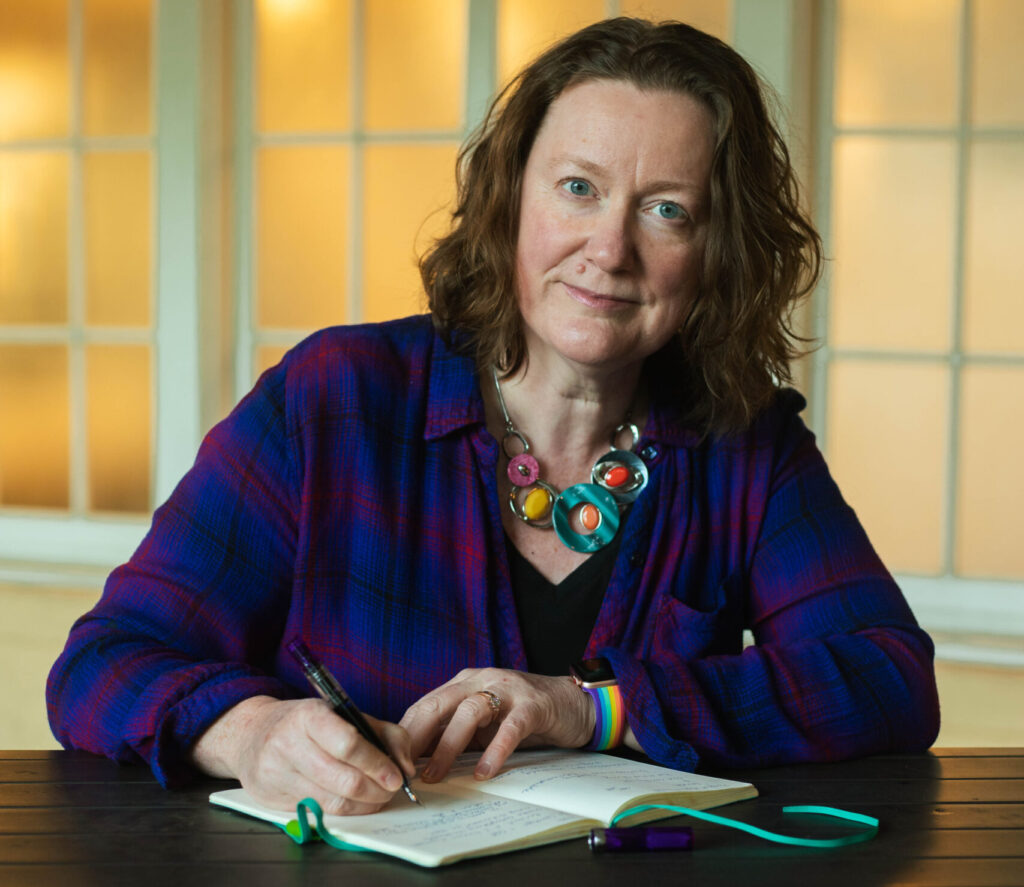

Julie Duffy
P. S. If you want me to send writing prompts to your email inbox every day of the challenge, make sure you’re signed up here (yes, even if you’ve signed up in the past)
It’s that time again: time to make your commitments to your writing for the coming month. Join us!
Welcome to the Serious Writers’ Accountability Group!
Post your goals for this month and let us know how you got on with last month’s goals.
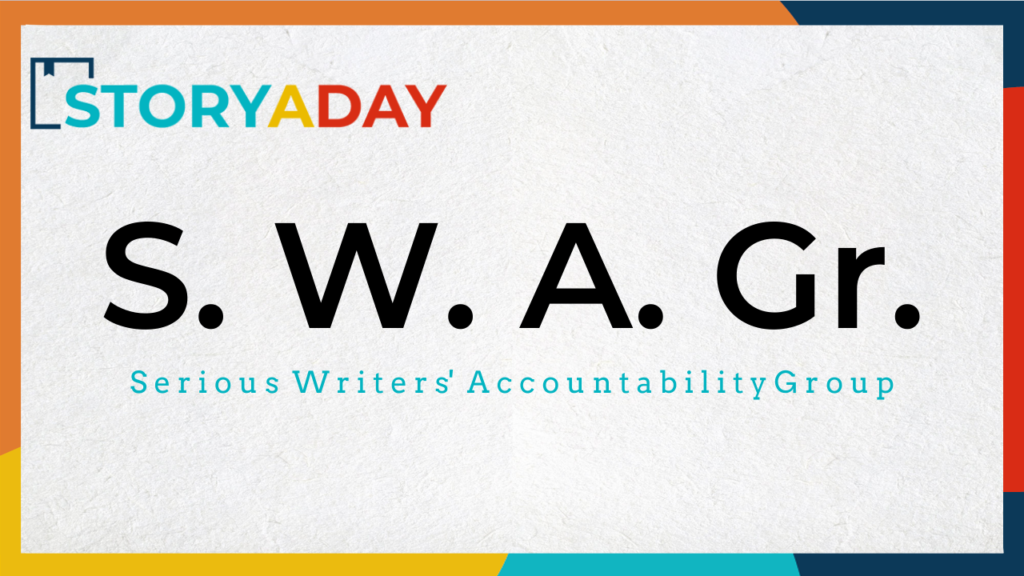
Leave a comment below telling us how you got on last month, and what you plan to do next month, then check back in on the first of each month, to see how everyone’s doing.
(It doesn’t have to be fiction. Feel free to use this group to push you in whatever creative direction you need.)
Did you live up to your commitment from last month? Don’t remember what you promised to do? Check out the comments from last month.
And don’t forget to celebrate with/encourage your fellow SWAGr-ers on their progress!
Download your SWAGr Tracking Sheet now, to keep track of your commitments this month
****
Examples of Goals Set By SWAGr-ers in previous months
So, what will you accomplish this month? Leave your comment below (use the drop-down option to subscribe to the comments and receive lovely, encouraging notifications from fellow StADa SWAGr-ers!)
(Next check-in, 1st of the month. Tell your friends!)
^^^ Watch (captions available)
˅˅˅ listen (mp3)
What to do when life won’t get out of your way.
We all go through seasons where other concerns pull at us (family, friends, world events). It doesn’t mean you’re failing as a writer if you are less productive at some times than others.
And I have some thoughts on how you can stay connected to your writer self even if the words aren’t flowing.
Links:
storyaday.org/3dc
Save these images and use them anywhere you post about your StoryADay May progress!
StoryADay May is just around the corner!
Here are your graphics for 2023
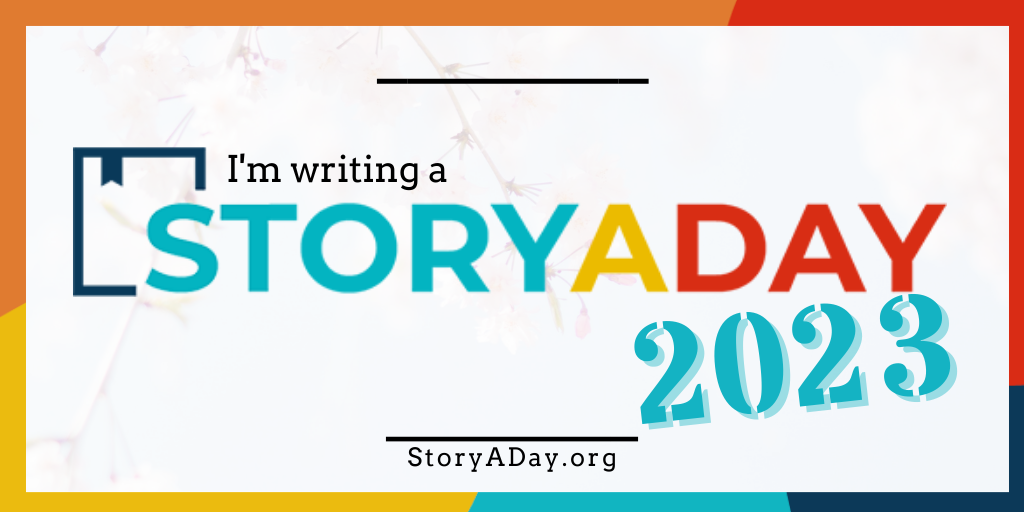

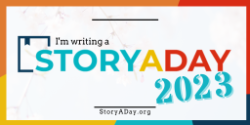

It’s really nice to know that there is still an outlet or a form of writing that I can do and still keep a full-time job while doing it.
And it didn’t really bend my schedule too much. So that’s how I really started exploring Flash
-K. B. Carle
In the second part of my conversation with author KB Carle (listen to Part 1 here) we talk about what attracted her to Flash Fiction; the challenges of moving from short to novel-length fiction; how to get unstuck ; and how being a writer includes building your community
There’s a ton of practical tips (and resources) to keep you going in this week’s episode. Enjoy!
Need the transcript? Click here
In Exchange for the Final Pudding Cup, We Offer Our Inner Thoughts, from The Offing (includes a Venn diagram)
Hello, My Name Is Marley in CRAFT Literary Magazine (this one has a word search!)
Vagabond Mannequin in Jellyfish Review (crossword clues as story!)
How We Survived , in Lost Balloon
Grace Q. Song‘s website
I Keep My Exoskeleton To Myself by M. Crane
Keep writing,
Julie
K.B. Carle lives and writes outside of Philadelphia, Pennsylvania. Her flash has been published in a variety of places including Lost Balloon, Five South Lit., The Rumpus, JMWW, and elsewhere. K.B.’s stories have been nominated for The Pushcart Prize, and her story, “Soba,” was included in the 2020 Best of the Net anthology. Her story, “A Lethal Woman,” will be included in the 2022 Best Small Fictions anthology. She can be found online at kbcarle.com or on Twitter @kbcarle.
Weekly writing prompts and lessons in your inbox, every Wednesday with the StoryAWeek Newsletter
When I’m most relaxed, here comes the character…
That’s when everybody decides to show up and just interrupt my day like they don’t have a care.
-K. B. Carle
In this conversation with author KB Carle we talk about writing flash fiction and micro fiction, the importance of community, getting through the middle, and more
Need the transcript? Click here
K.B. Carle lives and writes outside of Philadelphia, Pennsylvania. Her flash has been published in a variety of places including Lost Balloon, Five South Lit., The Rumpus, JMWW, and elsewhere. K.B.’s stories have been nominated for The Pushcart Prize, and her story, “Soba,” was included in the 2020 Best of the Net anthology. Her story, “A Lethal Woman,” will be included in the 2022 Best Small Fictions anthology. She can be found online at kbcarle.com or on Twitter @kbcarle.
I hope it’ll leave you inspired and ready to get to your own stories!
Keep writing,
Julie
P. S. You can listen to Part 2 here
Weekly writing prompts and lessons in your inbox, every Wednesday with the StoryAWeek Newsletter
When I’m most relaxed, here comes the character…
That’s when everybody decides to show up and just interrupt my day like they don’t have a care.
-K. B. Carle
In this conversation with author KB Carle we talk about writing flash fiction and micro fiction, the importance of community, getting through the middle, and more
Need the transcript? Click here
K.B. Carle lives and writes outside of Philadelphia, Pennsylvania. Her flash has been published in a variety of places including Lost Balloon, Five South Lit., The Rumpus, JMWW, and elsewhere. K.B.’s stories have been nominated for The Pushcart Prize, and her story, “Soba,” was included in the 2020 Best of the Net anthology. Her story, “A Lethal Woman,” will be included in the 2022 Best Small Fictions anthology. She can be found online at kbcarle.com or on Twitter @kbcarle.
I hope it’ll leave you inspired and ready to get to your own stories!
Keep writing,
Julie
Weekly writing prompts and lessons in your inbox, every Wednesday with the StoryAWeek Newsletter
It’s that time again: time to make your commitments to your writing for the coming month. Join us!
Welcome to the Serious Writers’ Accountability Group!
Post your goals for this month and let us know how you got on with last month’s goals.

Leave a comment below telling us how you got on last month, and what you plan to do next month, then check back in on the first of each month, to see how everyone’s doing.
(It doesn’t have to be fiction. Feel free to use this group to push you in whatever creative direction you need.)
Did you live up to your commitment from last month? Don’t remember what you promised to do? Check out the comments from last month.
And don’t forget to celebrate with/encourage your fellow SWAGr-ers on their progress!
Download your SWAGr Tracking Sheet now, to keep track of your commitments this month
****
Examples of Goals Set By SWAGr-ers in previous months
So, what will you accomplish this month? Leave your comment below (use the drop-down option to subscribe to the comments and receive lovely, encouraging notifications from fellow StADa SWAGr-ers!)
(Next check-in, 1st of the month. Tell your friends!)
It’s that time again: time to make your commitments to your writing for the coming month. Join us!
Welcome to the Serious Writers’ Accountability Group!
Post your goals for this month and let us know how you got on with last month’s goals.

Leave a comment below telling us how you got on last month, and what you plan to do next month, then check back in on the first of each month, to see how everyone’s doing.
(It doesn’t have to be fiction. Feel free to use this group to push you in whatever creative direction you need.)
Did you live up to your commitment from last month? Don’t remember what you promised to do? Check out the comments from last month.
And don’t forget to celebrate with/encourage your fellow SWAGr-ers on their progress!
Download your SWAGr Tracking Sheet now, to keep track of your commitments this month
****
Examples of Goals Set By SWAGr-ers in previous months
So, what will you accomplish this month? Leave your comment below (use the drop-down option to subscribe to the comments and receive lovely, encouraging notifications from fellow StADa SWAGr-ers!)
(Next check-in, 1st of the month. Tell your friends!)
In the second part of my conversation with Gwen E. Kirby we talk about developing characters that feel real to people, about writing at this moment in time, writing about women, and the question that Gwen Kirby doesn’t get asked often enough,
Gwen E Kirby is the author of the fabulous debut collection of short stories Shit Cassandra Saw. has a MFA from Johns Hopkins university. PhD from the University of Cincinnati and is the Associate Director of Programs and finance for the Sewanee Writers. Conference at the University of the South where she’s also teaching students about creative writing. Her writing has appeared in One Story Tin House Guernica. Smoke Long Quarterly, and many other places.
LINKS
Gwen’s book: https://stada.me/cassandra
This interview: https://storyaday.org/episode278
“when we leave our characters in sort of these vagaries, these big emotions and these big ideas, we don’t have anything to hang the characters or the emotions on.”
-Gwen E. Kirby
In the second part of my conversation with Gwen E. Kirby we talk about developing characters that feel real to people, about writing at this moment in time, writing about women, and the question that Gwen Kirby doesn’t get asked often enough,
Gwen E Kirby is the author of the fabulous debut collection of short stories Shit Cassandra Saw. has a MFA from Johns Hopkins university. PhD from the University of Cincinnati and is the Associate Director of Programs and finance for the Sewanee Writers. Conference at the University of the South where she’s also teaching students about creative writing. Her writing has appeared in One Story Tin House Guernica. Smoke Long Quarterly, and many other places.
Need the transcript? Find it here
I hope it’ll leave you inspired and ready to get to your own stories!
Keep writing,
Julie
Weekly writing prompts and lessons in your inbox, every Wednesday with the StoryAWeek Newsletter
There’s a memorable scene in the movie Silence of the Lambs, when Jodie Foster’s FBI supervisor points out that assumptions are treacherous “Because when you assume, you make an “ass” out of “u” and me…”
I was thinking about that today, as I prepare for another Critique Week, here at StoryADay.
When I interviewed Matthew Salesses, author of Craft in the Modern World, he talked about the difficulty of giving meaningful feedback to other writers if we don’t root out our unconscious biases.
Chances are, if you’re like me, most of the literary greats you were exposed to at school were white, male, and dead.
“Good stories” were those that were modeled after Faulkner or Joyce, or Poe.
But what if you’re being asked to read a story by your friend who is queer, 25, and an immigrant from Nigeria? How do you ‘judge’ that story?
In my experience, the best way to give helpful feedback is to get into conversation with the writer.
Some useful questions include:
I hope this gives you confidence to say ‘yes’, next time someone asks you for feedback.
Keep writing,
Julie
P. S. If you’re interesting in getting great feedback from some talented and thoughtful writers, find out more about the StoryADay Critique Week.
“So little of life is comprised of huge dramatic running out into the rain to cry “Stella!” If we saved our short fiction for only those moments, not only am I not totally sure what we would write about, but I’m not sure it would be all that accurate a portrayal of what it is to be a person.”
-Gwen E. Kirby
On this week’s podcast I’m in conversation with author Gwen E. Kirby, whose debut collection Sh*t Cassandra Saw was one of my absolute favorites from last year.
In our conversation we talk about the stories in her new collection, the benefit of a fantastic title, how to take an idea and develop it into a story.
Need the transcript? Find it here
Next week, in the second part of this interview, we will talk more about developing characters that feel real to people, about writing at this moment in time, writing about women, and the question that Gwen Kirby doesn’t get asked often enough.
It was a delightful conversation and I hope it’ll leave you inspired and ready to get to your own stories!
Keep writing,
Julie
P. S. Mary Robinette Kowal, who I interviewed a few episodes ago, is offering a class this Sunday on diagnosing (and fixing) story problems. I always leave her classes feeling as if someone has flipped my head open and dropped in a bunch of sparklers. You might want to check it out.
Weekly writing prompts and lessons in your inbox, every Wednesday with the StoryAWeek Newsletter
Therefore all should work. First because it is impossible that you have no creative gift. Second: the only way to make it live and increase is to use it. Third: you cannot be sure that it is not a great gift – If You Want To Write, Brenda Ueland
If You Want To Write, Brenda Ueland
We hold ourselves back.
We hold ourselves back because, what if our writing isn’t good enough?
What if we put in all this effort and we fail?
(First question: have you defined success for yourself, yet?)
It’s hard to know the quality of our own work.
We’re too close to it.
That’s when critique groups and writing buddies can come in handy.
Sometimes the word ‘critique’ scares us, but in my experience sharing work with writing friends often means they spot the parts of my writing that are working…and that I take for granted.
Why are we so critical of our own work?
Lots of reasons.
Today, I’m challenging you to ask yourself:
Isn’t it a little bit selfish for you to hold back?
↑↑↑ If that were true, what would you do, today? ↑↑↑
It’s that time again: time to make your commitments to your writing for the coming month. Join us!
Welcome to the Serious Writers’ Accountability Group!
Post your goals for this month and let us know how you got on with last month’s goals.

Leave a comment below telling us how you got on last month, and what you plan to do next month, then check back in on the first of each month, to see how everyone’s doing.
(It doesn’t have to be fiction. Feel free to use this group to push you in whatever creative direction you need.)
Did you live up to your commitment from last month? Don’t remember what you promised to do? Check out the comments from last month.
And don’t forget to celebrate with/encourage your fellow SWAGr-ers on their progress!
Download your SWAGr Tracking Sheet now, to keep track of your commitments this month
****
Examples of Goals Set By SWAGr-ers in previous months
So, what will you accomplish this month? Leave your comment below (use the drop-down option to subscribe to the comments and receive lovely, encouraging notifications from fellow StADa SWAGr-ers!)
(Next check-in, 1st of the month. Tell your friends!)
The current challenge has ended but I can let you know about the next one if you add you email address here:
Today I’m talking about the struggle to get back into a writing routine after the winter holidays. I know I’m not alone in expecting that fresh start feeling to kick in, in January, but it hasn’t happened for me yet. The chaos of the holidays can make it hard to get back into a routine. But, I have learned over the years as a writer, that if you want to improve, you have to take action and actually write. I have some tips that can help, and an invitation to join me in a tiny challenge later this month… Thanks for listening.
LINKS:
January Challenge: https://storyaday.org/jan-challenge
It’s that time again: time to make your commitments to your writing for the coming month. Join us!
Welcome to the Serious Writers’ Accountability Group!
Post your goals for this month and let us know how you got on with last month’s goals.
Leave a comment below telling us how you got on last month, and what you plan to do next month, then check back in on the first of each month, to see how everyone’s doing.
(It doesn’t have to be fiction. Feel free to use this group to push you in whatever creative direction you need.)
Did you live up to your commitment from last month? Don’t remember what you promised to do? Check out the comments from last month.
And don’t forget to celebrate with/encourage your fellow SWAGr-ers on their progress!
Download your SWAGr Tracking Sheet now, to keep track of your commitments this month
****
Examples of Goals Set By SWAGr-ers in previous months
So, what will you accomplish this month? Leave your comment below (use the drop-down option to subscribe to the comments and receive lovely, encouraging notifications from fellow StADa SWAGr-ers!)
(Next check-in, 1st of the month. Tell your friends!)
Join us as we talk about building a productive writing practice, no matter what…..
It’s an end-of-year episode with a twist (hint: don’t want to set New Year’s Resolutions? Join the rebellious crowd!)
Listen to the Audio
Watch the video
Watch video with full transcript here
LINKS:
Never miss an episode: Subscribe to the Podcast
Link to this episode: https://storyaday.org/episode253
Join the discussion in the Serious Writers’ Accountability Group (SWAGr)
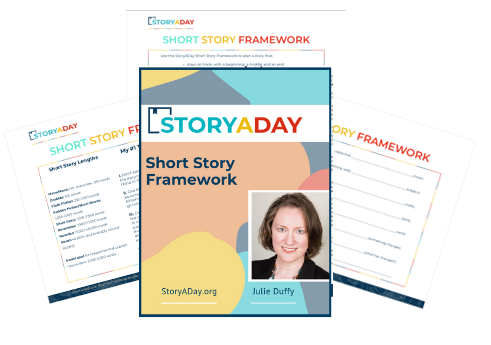
Download the free Short Story Framework and write today, not ‘some day’. Go from ‘idea’ to ‘the end’ without getting lost along the way!
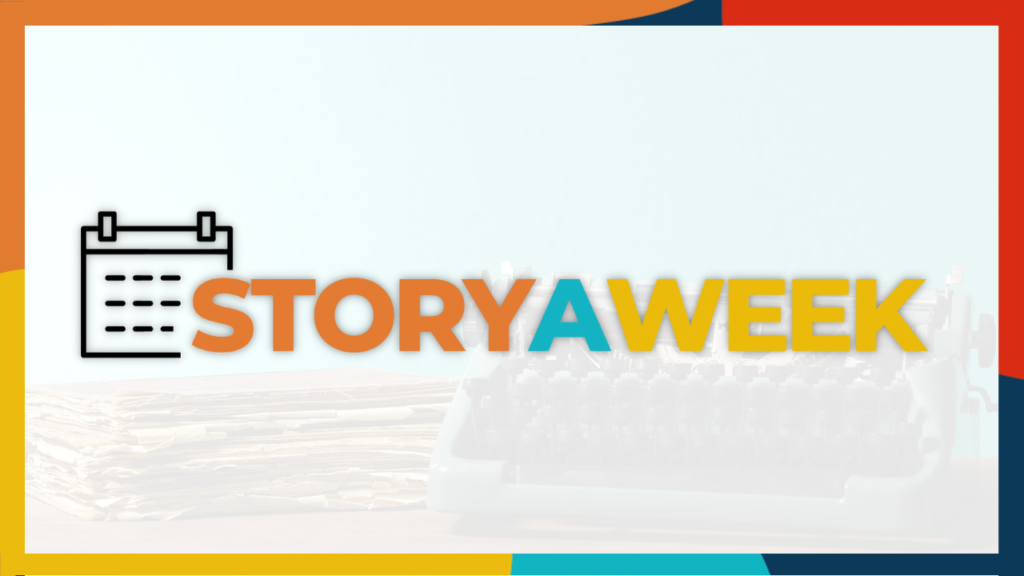
Weekly writing prompts and lessons in your inbox, every Wednesday with the StoryAWeek Newsletter
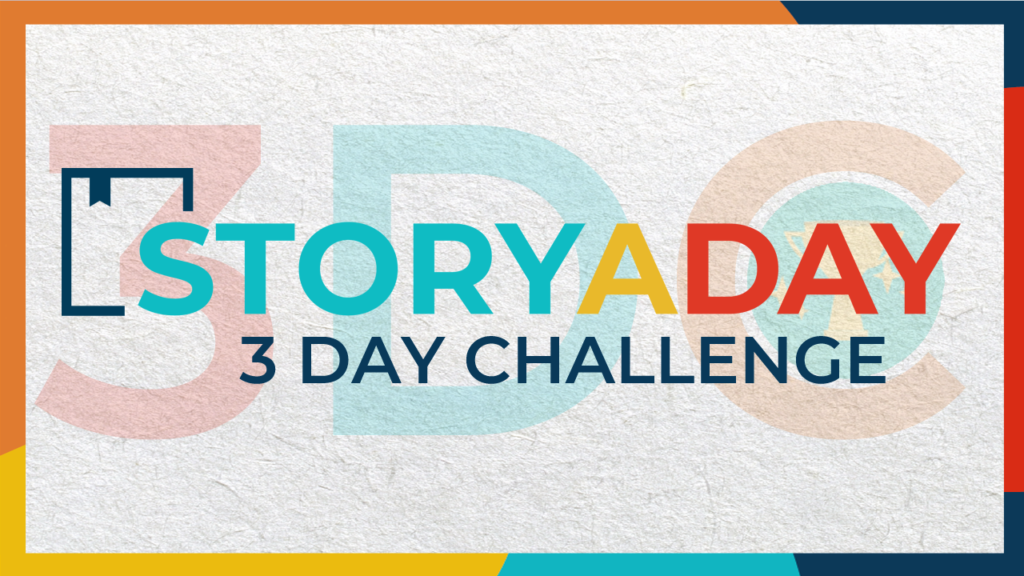
Take the 3-Day Challenge and write three short stories this weekend!
Join us as we talk about building a productive writing practice, no matter what…..
My conversation continues, with award-winning author Mary Robinette Kowal as we discuss her new novel The Spare Man and the art of writing even in the face of challenges. Don’t miss it!
Listen to the Audio
Watch the video
Watch video with full transcript here
LINKS:
Never miss an episode: Subscribe to the Podcast
Link to this episode: https://storyaday.org/episode273
Join the discussion in the Serious Writers’ Accountability Group (SWAGr)

Download the free Short Story Framework and write today, not ‘some day’. Go from ‘idea’ to ‘the end’ without getting lost along the way!

Weekly writing prompts and lessons in your inbox, every Wednesday with the StoryAWeek Newsletter

Take the 3-Day Challenge and write three short stories this weekend!
It made me want to come back for more stories from this anthology…
The Reading Room is a log of my “writer-as-reader” reactions to the short stories I’m reading now.
The author captures the voice and interior voice of teenage girls really well. In this story three teens are working at a store that resells items from lost baggage — the major industry in their town (!).
These girls don’t work at the most popular lost bagagge store, the one that draws all the visitors. Their is a down-market, knock-off version of it.
Each girl has her own place in the social pecking order, her own dreams for the future, and all this unspools quite naturally.
Interestingly, Kirby ignores the common wisdom that a story has to have a strong point-of-view character and that shifts in perspective must be clearly offset; that an omniscient narrator is a no-no….and it works. I’m going to have to go back and read this again to see why.
Kirby is a master of pulling me into the story.
“The girls of the Unclaimed Baggage Dept—Greenleaf, Alabama’s second-best and only other unclaimed baggage story– found Casper in a lime green suitcase.”
Look at the details!! It’s not just a store, it’s the “Unclaimed Baggage Depot–Greenleaf, Alabama’s second best and only other unclaimed baggage store.” It’s not just a suitcase, it’s a lime green suitcase.
We don’t know what or who Casper is. We have to keep reading.
Imagine if this read
“One Monday morning in summer, the girls who worked at an unclaimed baggage store found a [SPOILER ALERT] taxidermized albino wallaby in a suitcase.”
Still an intriguing premise, but ho-hum execution. You’ll have to work MUCH harder to get me to keep reading.
We zig zag between the girls’ hopes and dreams as they first figure out what to do with Casper and deal with the consequences of their actions.
Each scene builds up a stronger picture the girls, individually, and in relation to each other and their town.
….was a bit unexpected and I’m not sure how I feel about it. My favorite way to feel about a short story!
Takes us solidly into the perspective of the girl who is most active in the climax, and gives us a really interesting perspective to chew on (from her point of view; her reaction to events) as we close the book or turn the page. I wouldn’t call it a ‘happy’ or ‘sad’ ending, but I was satisfied.
It made me want to come back for more stories from this anthology…but not yet. I want to savor this one for a moment.
Find this story in Sh*t Cassandra Saw by Gwen Kirby
Join us as we talk about writing, cocktails and the art of writing what you don’t know…
Murder! Cocktails! Adorable service dogs!
Award-winning author Mary Robinette Kowal comes to the StoryADay podcast to discuss her new novel The Spare Man and the art of writing books you’d actually want to read. Don’t miss it!
Listen to the Audio
Watch the video
Watch video with full transcript here
LINKS
MaryRobinette.com
Mary Robinette Kowal’s Patreon
My Favorite Bit (10 best Fantine curses)
Never miss an episode: Subscribe to the Podcast
Link to this episode: https://storyaday.org/episode273
Join the discussion in the Serious Writers’ Accountability Group (SWAGr)

Download the free Short Story Framework and write today, not ‘some day’. Go from ‘idea’ to ‘the end’ without getting lost along the way!

Weekly writing prompts and lessons in your inbox, every Wednesday with the StoryAWeek Newsletter

Take the 3-Day Challenge and write three short stories this weekend!
It’s that time again: time to make your commitments to your writing for the coming month. Join us!
Welcome to the Serious Writers’ Accountability Group!
Post your goals for this month and let us know how you got on with last month’s goals.

Leave a comment below telling us how you got on last month, and what you plan to do next month, then check back in on the first of each month, to see how everyone’s doing.
(It doesn’t have to be fiction. Feel free to use this group to push you in whatever creative direction you need.)
Did you live up to your commitment from last month? Don’t remember what you promised to do? Check out the comments from last month.
And don’t forget to celebrate with/encourage your fellow SWAGr-ers on their progress!
Download your SWAGr Tracking Sheet now, to keep track of your commitments this month
****
Examples of Goals Set By SWAGr-ers in previous months
So, what will you accomplish this month? Leave your comment below (use the drop-down option to subscribe to the comments and receive lovely, encouraging notifications from fellow StADa SWAGr-ers!)
(Next check-in, 1st of the month. Tell your friends!)